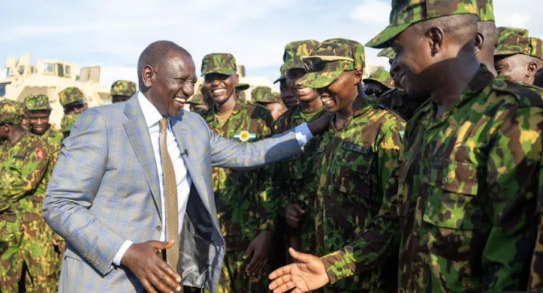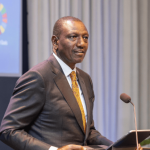The UN Security Council has extended the mandate of the Multinational Security Support (MSS) mission in Haiti until October 2, 2025, following the adoption of resolution 2699 (2023). The extension, previously set to expire in October 2024, comes as the Council emphasizes the importance of regular updates from both Haitian authorities and the MSS leadership on the mission’s progress.
Acting under Chapter VII of the UN Charter, the Council is considering the establishment of a UN Peace Operation to support the Haitian National Police (HNP) in maintaining security and building on the MSS mission’s achievements.
Kenyan police and personnel from Jamaica and Belize are currently involved in combating gang-related violence in Haiti. Despite challenges, including resource shortages, they have made significant progress in liberating areas previously controlled by gangs.
On September 26, 2024, MSS Force Commander Godfrey Otunge, along with his leadership team, met with Jesús Cisneros, the Chargé d’affaires of the Embassy of Mexico to Haiti, and his deputy Joanna Gomez Rodriguez. During the meeting, Otunge provided a status update, highlighting both the successes and challenges of the mission.
Otunge emphasized the need for air support to facilitate the deployment of officers and casualty evacuations, as well as the importance of establishing Forward Operating Bases (FOBs), which he believes will be crucial for the mission’s success.
He also called on the international community and foreign embassies in Haiti to provide greater support and resources to the Haitian National Police. Cisneros praised the mission’s efforts and expressed optimism that, with steady funding, more countries would contribute to and support the MSS mission.
Mexico has announced plans to train Haitian military personnel in an effort to support the fight against gangs in Haiti, according to Jesús Cisneros, the Chargé d’affaires of Mexico’s Embassy to Haiti. During a meeting with Multinational Security Support (MSS) mission leaders, Cisneros emphasized the importance of continuous joint operations between the Haitian National Police (HNP) and the MSS.
Despite progress, the MSS mission, led by Kenya, is facing significant challenges due to inadequate financial support. Member states initially pledged $84 million (Ksh. 10.8 billion) to the mission but have only contributed $67 million (Ksh. 8.6 billion) through the UN Trust Fund. This funding shortfall comes as the mission aims to deploy up to 2,500 police personnel in phases, with an estimated annual cost of $600 million.
UN Secretary-General António Guterres, addressing a ministerial meeting on Haiti, praised Kenya, Belize, and Jamaica for deploying personnel to help restore order. However, he expressed concern over the lack of sufficient funding, urging those who made financial commitments to follow through.
Guterres also noted progress in establishing transitional governance in Haiti, including the appointment of Garry Conille as Prime Minister. However, he warned that gangs continue to control much of the capital, Port-au-Prince, subjecting civilians to violence, including severe human rights abuses and sexual violence against young women and girls.
Haitian Prime Minister Garry Conille echoed these concerns at the ministerial meeting, stating that Haiti remains far from winning its battle against the gangs. He urged the international community to provide more assistance, noting the urgent need to restore peace in the country.
The MSS, approved by the UN Security Council in October 2023, is a non-UN mission, and its funding relies on contributions from member states.
The Multinational Security Support (MSS) mission in Haiti could potentially transition into a full United Nations peacekeeping operation, following discussions led by international leaders. President William Ruto of Kenya, during his visit to Port-au-Prince on September 21, 2024, expressed Kenya’s support for this transition. He stated that Kenya has no objections to converting the MSS into a UN peacekeeping mission if the UN Security Council deems it necessary.
The idea of converting the MSS to a UN peacekeeping mission has been supported by the United States, which believes formalizing the mission under UN auspices would allow for automatic and increased funding through the UN system. This change would enhance efforts to restore peace in Haiti, where gangs continue to control large parts of the capital, Port-au-Prince, and human rights abuses remain a significant issue.
However, the final decision rests with the UN Security Council. According to Stéphane Dujarric, the spokesperson for the UN Secretary-General, any move to transition the MSS into a peacekeeping mission requires both the agreement of the Haitian government and the approval of the Security Council. If the council decides to proceed, the Secretary-General will act accordingly.
This discussion follows the recent extension of the United Nations Integrated Office in Haiti (BINUH) until July 15, 2025, which continues to support Haiti’s governance and stability efforts. With challenges in funding the MSS mission and its goal of deploying 2,500 personnel, transitioning to a UN peacekeeping mission could provide the necessary financial and operational support.



